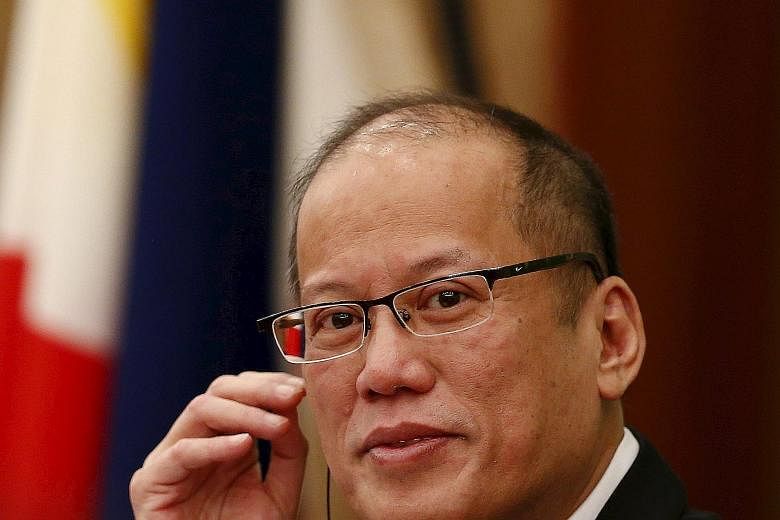When Mr Benigno Aquino III became the Philippines' 15th President in 2010, few had high expectations. After all, his critics insisted, he was elected because of his pedigree.
Mr Aquino is the son of former senator Benigno Aquino Jr, an opposition icon whose assassination in 1983 triggered massive upheavals that eventually led to the fall of strongman Ferdinand Marcos during the 1986 People Power revolution. The heroine of that revolution was Mr Aquino's mother, Cory, who became the 11th President.
But as he delivers his last State of the Nation Address today and cruises into his last year in office, Mr Aquino can say he has lived up to his name.
When he steps down on June 30 next year, the Philippines should be in better shape than when he took office. Gross domestic product (GDP) growth has averaged 6.4 per cent under him, with quarters that even broke through 8 per cent.
By comparison, growth under his predecessor, Mrs Gloria Arroyo, had been a lacklustre 4.8 per cent.
Per capita income, meanwhile, has risen from US$2,135 in 2010 to US$2,765 (S$3,800) last year.
After nine upgrades since 2010, Philippine debt is now rated investment grade.
The country has also been recognised as "the most improved country" in the World Economic Forum's competitiveness index, having improved its ranking from 85th in 2010 to 52nd last year.
Yet, for former senator Manuel Villar, a billionaire property developer, there is nothing remarkable about Mr Aquino's economic scorecard. He said remittances from millions of Filipinos abroad and the call centre industry pour more than US$50 billion into the Philippine economy each year.
That accounts for GDP growth of 5 per cent to 6 per cent.
"The 5 per cent to 6 per cent is a given... It does not matter who is President," said Mr Villar.
Also, although growth is real, little is trickling down to the masses.
"I give him a fail grade," said Ms Ella Salvacion, 42, a call centre employee with a US healthcare provider. She says she now makes more than what she did in 2010, but prices of basic goods like rice and costs of utilities have risen faster than her salary.
Mr Aquino's own Welfare Minister, Mr Dinky Soliman, admitted the government's flagship anti-poverty programme has been devalued by soaring food prices.
Ms Salvacion, playing on Mr Aquino's election slogan "on to a straight path", said: "His path has not been straight."
While she was not referring to Mr Aquino's other key programme, an anti-corruption campaign, this has also been criticised despite having yielded results.
Mr Aquino took office in 2010 on a promise to combat graft, which drains over 200 billion pesos (S$6 billion) from the government's coffers each year. The numbers show that he has kept that promise.
The country's ranking on Transparency International's corruption index has improved from 139 in 2009 to 85 at the end of last year.
The anti-graft drive netted three powerful senators accused of siphoning billions' worth of public funds into their personal accounts.
But Mr Aquino's critics say his war on corruption is flawed.
The President comes down hard on his political adversaries, but he also shelters his allies, said Mr Walden Bello, a lawmaker who left Mr Aquino's coalition party over policy differences.
Mr Bello said a long-time Aquino family friend, the Budget Minister Butch Abad, has managed to stay in office although he is embroiled in the same fund-juggling scandal that implicated the three jailed senators, all opposition party stalwarts.
Another close associate who cost Mr Aquino valuable political capital was former police chief Alan Purisima - key planner of a botched police raid to capture Malaysian terrorist Zulkifli Hir in January that cost the lives of 44 police commandos.
While Mr Aquino was scathing in criticising the other planners of that operation, he defended Mr Purisima, his former bodyguard, downplaying his role in the operations, saying he was only an adviser.
That Mr Aquino is fiercely loyal to his friends and unyielding to foes reflects a tenacity that usually serves him well, but at other times has led him to a political cul de sac.
He managed, for instance, to steer through Congress a birth control law, despite opposition from the powerful Catholic Church.
But his intransigence has plunged relations with China to new lows.
He has angered China by likening its push into territories in the South China Sea to Nazi Germany's expansionism in Europe prior to World War II.
As he did last year, Mr Aquino is expected to again trumpet his achievements in his State of the Nation Address today.
He will likely drive home the need for continuity as he uses his address to tacitly rally voters behind whomever he will endorse as his successor.
Pundits say that candidate is Interior Minister Mar Roxas.
But how much Mr Aquino's success will rub off on Mr Roxas and boost his sagging campaign remains to be seen.
While Mr Aquino seeks to define his legacy, there are those already measuring his true worth and who find it wanting.

